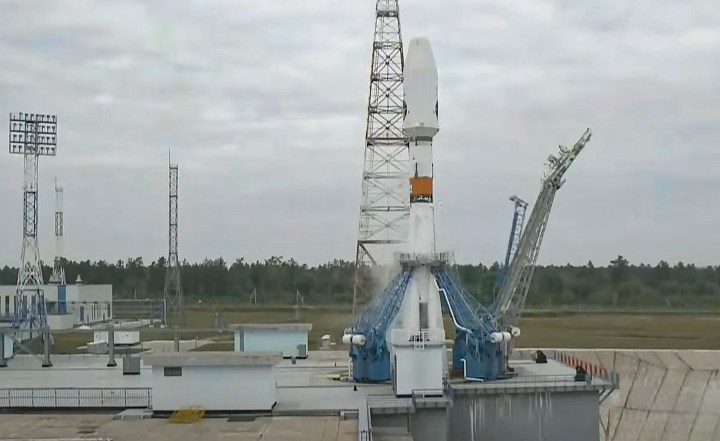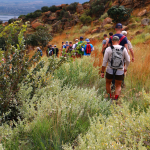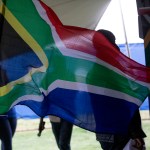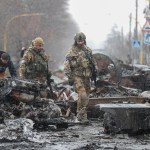SPACE RACE
Russia launches lunar lander in race to find water on moon

MOSCOW, Aug 11 (Reuters) - Russia launched its first moon-landing spacecraft in 47 years on Friday in a bid to be the first nation to make a soft landing on the lunar south pole, a region believed to hold coveted pockets of water ice.
The Russian lunar mission, the first since 1976, is racing against India, which launched its Chandrayaan-3 lunar lander last month, and more broadly with the United States and China, both of which have advanced lunar exploration programs targeting the lunar south pole.
A Soyuz 2.1v rocket carrying the Luna-25 craft blasted off from the Vostochny cosmodrome, 3,450 miles (5,550 km) east of Moscow, at 2:11 a.m. on Friday Moscow time (1111 GMT on Thursday), with its upper stage boosting the lander out of Earth’s orbit toward the moon over an hour later,Russia’s space agency Roscosmos confirmed.
The lander is expected to touch down on the moon on Aug. 21, Russia’s space chief Yuri Borisov told Interfax on Friday. Russian space agency Roscosmos previously pegged Aug. 23 as the landing date.
“Now we will wait for the 21st. I hope that a highly precise soft landing on the moon will happen,” Borisov told workers at the Vostochny cosmodrome after the launch, according to Interfax.
Luna-25, roughly the size of a small car, will aim to operate for a year on the moon’s south pole, where scientists at NASA and other space agencies in recent years have detected traces of water ice in the region’s shadowed craters.
There is much riding on the Luna-25 mission, as the Kremlin says the West’s sanctions over the Ukraine war, many of which have targeted Moscow’s aerospace sector, have failed to cripple the Russian economy.
The moonshot, which Russia has been planning for decades, will also test the nation’s growing independence in space after its February 2022 invasion of Ukraine severed nearly all of Moscow’s space ties with the West, besides its integral role on the International Space Station.
The European Space Agency had planned to test its Pilot-D navigation camera by attaching it to Luna-25, but severed its ties to the project after Russia invaded Ukraine.
“Russia’s aspirations towards the moon are mixed up in a lot of different things. I think first and foremost, it’s an expression of national power on the global stage,” Asif Siddiqi, professor of history at Fordham University, told Reuters.
US astronaut Neil Armstrong gained renown in 1969 for being the first person to walk on the moon, but the Soviet Union’s Luna-2 mission was the first spacecraft to reach the moon’s surface in 1959, and the Luna-9 mission in 1966 was the first to make a soft landing there.
Moscow then focused on exploring Mars and since the 1991 fall of the Soviet Union, Russia has not sent scientific probes beyond earth orbit.
MOON WATER?
Major powers such as the United States, China, India, Japan and the European Union have all been probing the moon in recent years. A Japanese lunar landing failed last year and an Israeli mission failed in 2019.
No country has made a soft landing on the south pole. An Indian mission, Chandrayaan-2, failed in 2019.
Rough terrain makes a landing there difficult, but the prize of discovering water ice could be historic: large could be used to extract fuel and oxygen, as well as be used for drinking water.
“From the point of view of science, the most important task, to put it simply, is to land where no one else has landed,” said Maxim Litvak, head of the planning group for the Luna-25 scientific equipment.
“There are signs of ice in the soil of the Luna-25 landing area; this can be seen from the data from orbit,” he said, adding that Luna-25 would work on the moon for at least an earth year, taking samples.
Roscosmos said that it would take five days to fly to the moon. The craft will spend 5-7 days in lunar orbit before descending to one of three possible landing sites near the pole – a timetable that implies it could match or narrowly beat its Indian rival to the moon’s surface.
Chandrayaan-3 is due to run experiments for two weeks.
With a mass of 1.8 tons and carrying 31 kg (68 pounds) of scientific equipment, Luna-25 will use a scoop to take rock samples from a depth of up to 15 cm (6 inches) to test for the presence of frozen water.
By Guy Faulconbridge and Joey Roulette
(Reporting Guy Faulconbridge in Moscow and Joey Roulette in Washington; Editing by Leslie Adler and Gerry Doyle)




















Comments - Please login in order to comment.